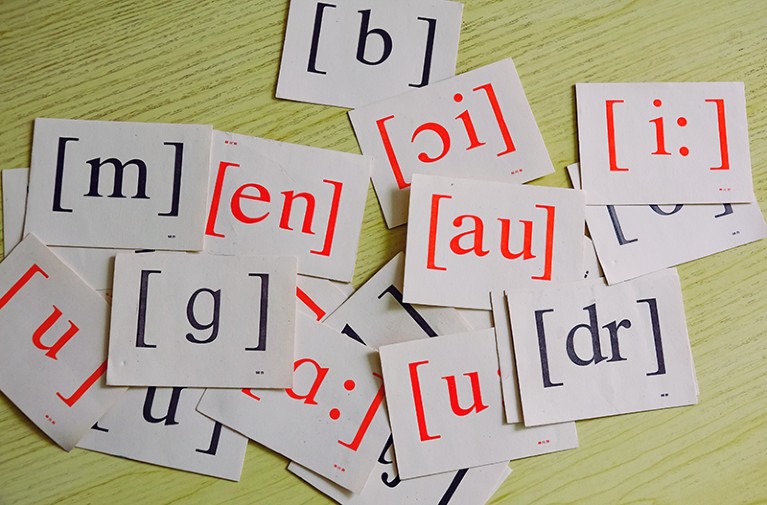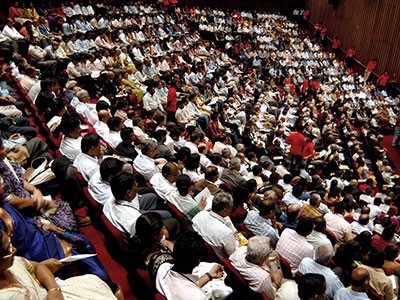
Some people use cards with phonetic symbols to help them learn English.Credit: Peng Song/Getty
Researchers whose first language is not English can spend around twice as long reading an English-language scientific journal article as native speakers. For a PhD student working on their thesis, that can mean spending up to 19 additional working days per year just reading papers.
English is the language of science – but precision is tough as a non-native speaker
These statistics, published today in PLoS Biology1, might not be shocking, researchers say, but it’s important to measure the effects of language barriers on the careers of academics who are not fluent in English. It “is the first step for the scientific community to make more effort to tackle this problem”, says Tatsuya Amano, a biodiversity researcher at the University of Queensland in Brisbane, Australia, and a co-author of the study.
Amano and his colleagues polled 908 environmental scientists from 8 countries, each of whom had authored at least one peer-reviewed paper in English. Some of the participants were from countries where a moderate proportion of people are proficient in English (Bolivia, Spain and Ukraine), whereas others were from countries where proficiency in English is uncommon (Bangladesh, Japan and Nepal). Their answers were compared with those from people in countries where English is the official language (Nigeria and the United Kingdom).
The team found that among scientists who had published only one paper in English, those from countries with generally low English proficiency spent a median of 29.8% more time writing it than did native speakers; those from countries with moderate English proficiency spent a median of 50.6% more time. Similarly, the researchers found that those from countries with generally low English proficiency spend a median of 90.8% more time reading scientific articles than do native speakers. They also learnt that non-native speakers spend more time preparing to give oral presentations at international conferences, and that many avoid this type of commitment owing to language barriers.
Amano, who is Japanese, says he has always struggled to communicate in English. After many years working in the United Kingdom and Australia, his English is improving, and people might think his papers are similar to those written by a native English speaker. “But behind the scenes, I have to spend so much time to reach that level,” he says. That extra effort is exactly what he wanted to quantify in this study.
Heightened rejection
Amano and his colleagues also examined the peer-review process. Non-native English speakers reported having their papers rejected specifically because of writing issues 2.5 times as often as native speakers. That sounds familiar to Lina Pérez-Angel, a Colombian palaeoclimatologist at Brown University in Providence, Rhode Island. “I have had reviewers that explicitly said that my English puts in doubt the quality of the research, or mostly gave me feedback on my English in a harsh way that made me think it was based on my Latinx/Hispanic-sounding last name,” she says.
Indian initiatives aim to break science’s language barrier
And the challenges are not limited to papers and presentations, says Paula Iturralde-Pólit, an Ecuadorian ecologist at the University of Costa Rica in San José. “It’s in every step in the process of becoming an academic,” she says. In her experience, applying for grants to fund research projects, for example, takes much longer for someone not highly proficient in English. “It also takes more time for your adviser to review it, because you will have more errors.”
At conferences, even those who overcome the hurdle of presenting their work in English face difficulties. Germana Barata, a researcher who specializes in science communication at the State University of Campinas in Brazil, says that despite being fluent in English, she still feels uncomfortable at times. “We are given the same amount of time to present, but what we can say in 10 minutes is different from what a native speaker can say,” she points out.
The study has probably underestimated the impact of language barriers, because it doesn’t account for people who drop out of academia owing to the challenges described, Amano notes. Many of those who remain, Barata says, feel that language acts as an obstacle to sharing their work and advancing their careers. “We have a much longer and slower journey to project ourselves and to have our work projected abroad,” she says.
Amano thinks that solving the problem should not be the responsibility solely of the people experiencing the language barrier. Journals could provide access to artificial-intelligence tools to assist researchers with writing, for example, or could connect authors with proficient English speakers to help review their articles. Conferences could consider allowing researchers to present in their native language, using a translator, and could publish abstracts in multiple languages. “Non-native English speakers constitute almost 95% of the world’s population,” Amano says. “If we don’t support those 95%, I’m sure we can’t solve many global challenges.”

 English is the language of science – but precision is tough as a non-native speaker
English is the language of science – but precision is tough as a non-native speaker
 Indian initiatives aim to break science’s language barrier
Indian initiatives aim to break science’s language barrier
 When English is not your mother tongue
When English is not your mother tongue
 Don’t focus on English at the expense of your science
Don’t focus on English at the expense of your science
 Being fluent in a second language can boost your research
Being fluent in a second language can boost your research


